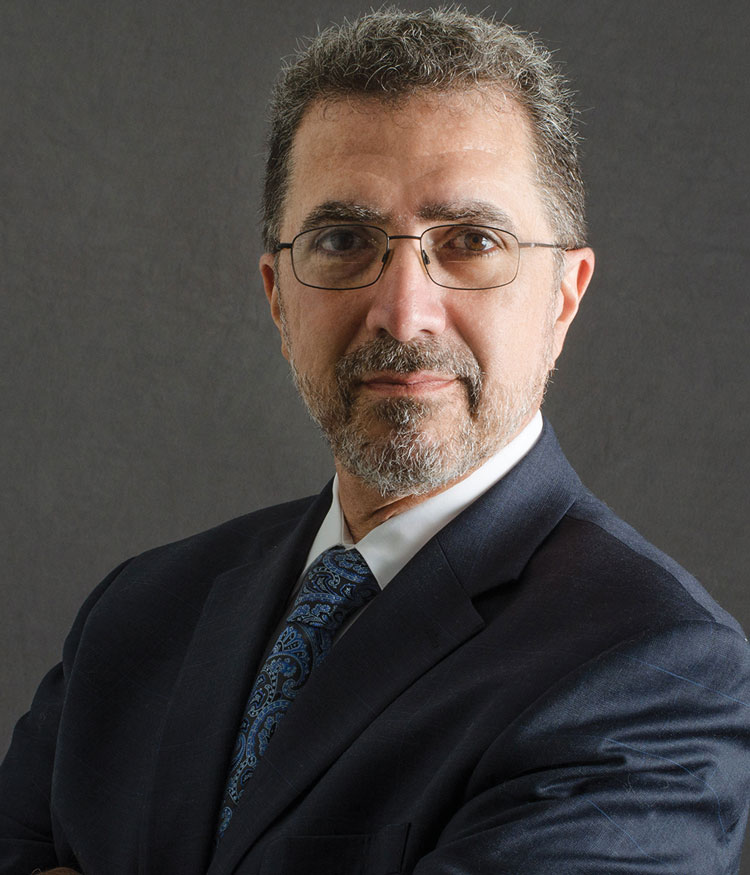Building a niche law practice rewards extra work, special training

Jorge Espinosa: “At my first law firm job, I realized that I needed a niche to stand out and become partner. So I gradually took over doing all of their IP work.” Photograph courtesy of Espinosa Martinez
FLYING HIGH
The first step is choosing a niche. When making the choice, it should be within a topic you love because hopefully you’ll immerse yourself in that niche for many years to come, says Josh Horn, co-chair of the cannabis law practice and a partner at Fox Rothschild in Philadelphia.
He actively sought out cannabis law after he took a trip to Colorado four years ago, just after marijuana was legalized there. Previously, Horn had been a commercial litigator focused on securities and financial services.
“My wife suggested that I should consider becoming a cannabis lawyer because it was obviously here to stay,” Horn says. “Although my main focus had been representing financial advisory companies, individual advisers and counselors in FINRA [the Financial Industry Regulatory Authority] examinations, my interest in the cannabis space was piqued, and I saw the opportunity to expand upon my practice.”
After his trip to Colorado, Horn became a voracious reader on the subject, studying cannabis books and laws from around the United States. To keep up with the ever-changing marijuana trends, Horn set up news alerts; and he reviewed (and still reviews) about 50 stories daily on the subject. He also created an interactive survey tracking relevant laws on the books in more than 25 states and the District of Columbia.
“Because cannabis law was, and still is, such a new area, there is no leading treatise to rely on,” Horn says. “When I set out to master it, I had to create my own curriculum.” His most helpful books include Weed the People: The Future of Legal Marijuana in America by Bruce Barcott and Cannabis: A History by Martin Booth.
Eventually, valuable resources popped up, such as the Cannabis Law Journal (Horn is on the editorial board) and the National Cannabis Bar Association, which had its first meeting this year. After the Pennsylvania medical marijuana law passed, Horn joined the effort to help the state’s Department of Health craft regulations by attending a conference called the Marijuana Medical Regulatory-palooza.
Now, Horn concentrates on all aspects of cannabis law, including assisting clients seeking licenses to grow, process and dispense cannabis for medical use or “adult use.” He markets his practice as a frequent speaker at CLE classes, as well as industry-specific conferences on matters such as cannabis and the workplace.
“Getting involved with the marijuana business market has absolutely brought in more clients, and it’s an exciting time to be part of this industry experiencing such growth,” Horn says.
According to law firm consultancy Edge International, marijuana law was projected to be one of the fastest-growing practice areas in 2017. Additionally, several large law firms, including Duane Morris, Foley Hoag, Riker Danzig and Horn’s firm, Fox Rothschild, have created legal cannabis practice groups in the last few years.
Jorge Espinosa, an intellectual property lawyer and partner at Espinosa Martinez in Miami, agrees that lawyers should find their niche in an area they already love, “so that you’re combining your hobby with law.” A 1988 graduate of the University of Miami School of Law, he took advantage of previous knowledge to find his niche. Before going to law school, he worked as a self-taught computer programmer.
“At my first law firm job, I realized that I needed a niche to stand out and become partner,” Espinosa says. “So I gradually took over doing all of their IP work.”
Greg Reigel, an aviation partner at Shackelford, Bowen, McKinley & Norton in Dallas, says, “With so many lawyers out there, focusing on a niche rather than a more general practice area helps to limit the competition.”
“If the niche is something of a personal interest, it makes the niche practice area more fun,” Reigel adds.
At the time, there weren’t many attorneys in his area, but Reigel joined the few aviation legal organizations he could find and attended related conferences and CLEs so he could meet other lawyers practicing aviation law. He also studied and researched aviation law issues by reading cases, regulations and everything else he could find.
Next, it was time to market himself as an aviation law specialist. So Reigel created a law blog and began to write posts and articles to publicize his expertise in aviation law. And all of these efforts have resulted in business.
“Being in the organizations and attending conferences allowed me to meet people and make connections, which eventually factored into my joining Shackelford as a partner,” Reigel says.
GO WHERE THE OTHERS AREN’T

Greg Reigel: “Being in the organizations and attending conferences allowed me to meet people and make connections, which eventually factored into my joining Shackelford as a partner.” Photograph courtesy of Greg Reigel
It never occurred to Caitlin DiMotta to become a lawyer. She had always wanted to be a ballerina. But after high school, when she was helping a friend complete 501(c)(3) paperwork to establish a nonprofit dance theater, she started to think more about her future—especially when it took her three months and four seminars from a volunteer lawyer organization for the arts in Chicago to determine how to fill out the form.
DiMotta was intrigued by the law and wanted to learn more about it, but her primary focus remained on becoming a dancer. But that was until she was told at age 22 that she’d need a hip replacement soon. DiMotta decided to hang up her ballet shoes and, remembering her interest in the law, take the LSAT. She figured if she couldn’t pursue her art, she could help other artists navigate the complicated and intimidating legal world.
She got her chance after she graduated from the University of New Mexico School of Law in 2006. She moved to Seattle with her husband, an aspiring comic book writer; and shortly after arriving in town, she befriended Ed Brubaker, who’s written comic books starring the likes of Batman, Captain America, Catwoman and Daredevil. He asked DiMotta to look at his contracts. She did, and he told others about her work. Pretty soon a niche was born.
Few comic book attorneys exist, although the genre tends to be a mix of literary publishing and movie exploitation, so there’s a real need for lawyers, DiMotta says.
“It felt very organic, beginning with a dearth of lawyers servicing a particular community—comics—and my being in a unique position to help that community in a personal way,” says DiMotta, who is now an attorney at Katz Golden Rosenman in Santa Monica, California. “I would even say that now my practice has broadened because comics have become so mainstream, and so many comics are being adapted for television, film and video games.”
Danielle Braff is a freelance writer based in Chicago. This article was published in the June 2018




